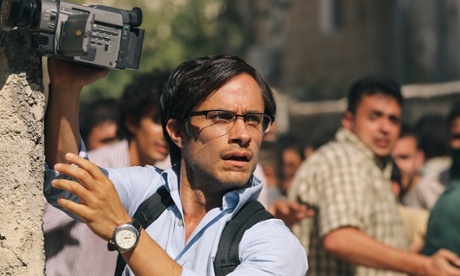“Rosewater” is a truly intriguing interpretation of wrongful imprisonment in Iran, provided through “Daily Show” host Jon Stewart’s directorial debut.
The film, which is based on a true story, follows journalist Maziar Bahari (Gael García Bernal, “Amores Perros”) as he visits Iran, his birth country, to cover the upcoming elections. It is only after his quirky chauffeur brings him to meet his rebellious friends that Bahari becomes interested in covering the true controversy behind the elections, which pitted incumbent Mahmoud Ahmadinejad against Mir-Hossein Mousavi. Ahmadinejad won the vote and support of Supreme Leader Khamenei, but there were many doubts and concerns regarding the regularity of the voting procedures. This resulted in huge protests and the emergence of the Iranian Green Movement.
After releasing a particularly violent protest video to British media, unknown Iranian officials take Bahari from his home. He notices the distinguishing scent of rosewater on his captor (Kim Bodnia, “Pusher”), but knows nothing else of his capture. Bahari undergoes hopeless months of interrogation regarding his alleged espionage activity, which is – in reality – nonexistent. Throughout the interrogations, rosewater pervades his senses.
He begins to give up on his situation, unsure if his wife (Claire Foy, “Season of the Witch”, “Wreckers”), pregnant at home in London, and his mother (Shohreh Aghdashloo, “X-Men: The Last Stand”), witness of his capture, have fought enough to get his release. Bahari can only find out by waiting.
Stewart makes it clear throughout that he’s found a seat in the director’s chair. Well-informed, with hints of his signature humor, “Rosewater” balances the brutality of interrogation and the absurdity of over-suspicious government officials.
At a turning point in the film, you may find yourself laughing out loud at Bahari’s situation. The change in mood is quite frankly surprising and may seem inappropriate for the subject. However, the preceding struggle and the reality of other prisoners still ensure that the underlying themes of repressive government run clear.
There is also a clear message of the contradiction between the Iranian government, especially in the religious branch, and the citizens of the country. Bahari hits a chord when claiming in an interview that the American and Iranian people are not so different – a comment which his interrogator later claims is treason.
This message also directs the American public. Oftentimes, Americans are lead to believe that Iran is a country of hatred because of the messages of its leaders. The movie hints at this as an interrogator refers to the United States as “the Great Satan”. It is not well-known that Iran was once the most modern countries in the Middle East and its people continue to have relatively open ideology. Bahari struggles with this and is repressed by the Iranian government for attempting to convey this message. The theme is driven throughout the movie and it clearly directs movie-goers to rethink stereotypes.
The movie lacks any big-name actors, but the film does not suffer from this fact in any way. García Bernal performs the leading role well, portraying the initial timidity and increasing courage of a foreign journalist in a tumultuous international situation. The other roles are all well-executed and the relatively new faces to Hollywood ensure that the film doesn’t focus on acting tricks to draw in the audience.
Overall, “Rosewater” skillfully wove together humor, drama and international intrigue into a rich, modern film that is a must-see, especially for those looking for a fresh perspective on the political struggle within Iran.











